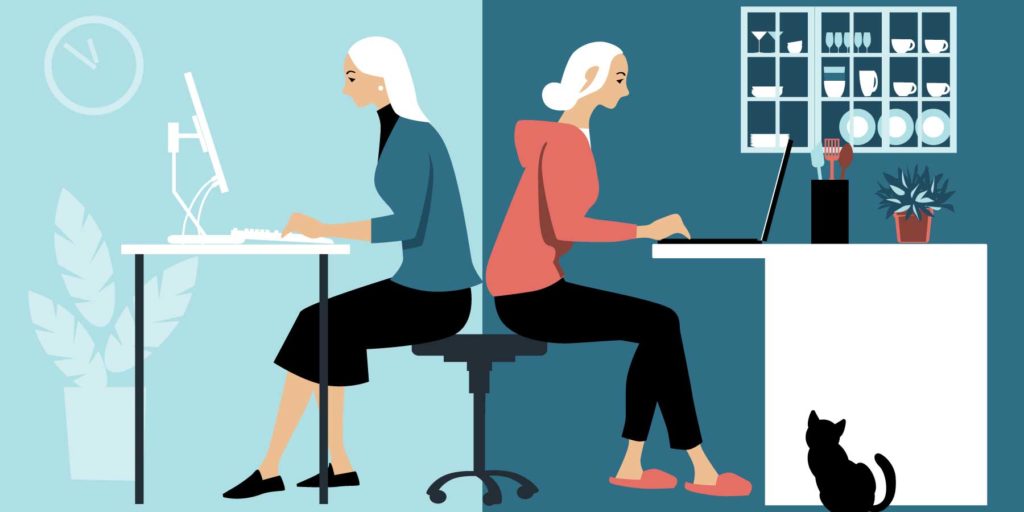For months, headlines have teased a seemingly inevitable transition to “hybrid work,” in which employees split time between traditional office settings and remote environments.
While this new paradigm is still speculative—many companies have delayed even a partial return to the office in the wake of surging COVID-19 cases—there’s no shortage of conjecture about what the future holds, particularly for creative industries and professionals.
Freelancers may be wondering about the ripple effect. Will current job market trends change the way they work with clients? We dug into the data to find out.
A possible ‘freelance boom’
Freelancers were early adopters of the work-from-home trend. According to research from Upwork and Freelancers Union, there were 57 million freelancers working from home in 2019. For them, the transition to 100 percent remote work during the pandemic was likely less jarring than for their full-time, office-going counterparts.
But now, office-goers have seen the light—and the majority of them don’t want to go back to the status quo. A May 2021 Morning Consult study for Bloomberg News found that 39 percent of surveyed adults—and 49 percent of millennials and Gen Z respondents—would consider quitting their jobs if their employers rescinded the option to work remotely.
This could impact established freelancers in a couple of ways. For one, disillusioned full-timers may very well join the ranks of the freelance workforce. Upwork recently released a report that found as many as 10 million Americans are currently considering going freelance. Of those, nearly three-quarters (73 percent) cited the ability to work remotely or in a flexible capacity as the reason for entertaining the shift.
Companies, too, seem to be more open-minded about contract work these days. Forbes reports that nearly half (47 percent) of hiring managers are more likely to hire independent contractors since the onset of the pandemic. If the “Great Resignation” is as pronounced as anticipated, some companies may open up previously full-time roles to freelancers, at least temporarily, to patch org chart gaps and keep operations running smoothly.
For freelance creatives, that would mean more competition—but more opportunities, too.
Furthermore, some industries seem primed to expand to a more freelancer-based model for the long term. In a separate study, Upwork also found that an estimated 25.7 million jobs in non-tech industries can now be done by remote freelancers. (Though as a freelance gig site, Upwork is a notably biased source here.)
Freelancers may embrace ‘hybrid’ too
With so much reluctance to return to the office full-time, a shift to a hybrid office arrangement could make sense for many companies. Accenture’s 2021 Future of Work Study found that 83 percent of full-time professionals prefer a hybrid model, working remotely 25-75 percent of the time.
If employers bite, it could be a boon for freelancers looking for the ability—but not the requirement—to work in a communal space. Feeling disconnected from colleagues is a chief complaint of many freelancers; the option to head into an office a couple of days a week could lessen those feelings of isolation. If publications, agencies, and other creative organizations offer “hot desk”-style flexibility, it could also improve freelancers’ ability to connect with clients and possibly even work alongside editors.
An influx of new creative freelancers entering the workforce would mean more competition—but more opportunities, too.
Coworking, too, could provide opportunities for networking, finding camaraderie, and combatting loneliness. Although most coworking spaces hit a lull during the pandemic, many are slowly but surely on the rebound. Some coworking and “flex” workspaces have also slashed costs or changed their business models to coax new members in the door, potentially making offerings more attractive to freelancers and smaller startups.
In January, Freelance UK predicted that the coworking trend for freelancers isn’t likely to slow down: “We see a future of coworking spaces being the norm… a balanced part of a widespread work-from-home and work-near-home model.”
While there are still countless unknowns about how the post-pandemic workplace will take shape, one thing is clear: Right now, the bargaining chips are largely stacked in favor of workers—and freelancers stand to see some benefits.
